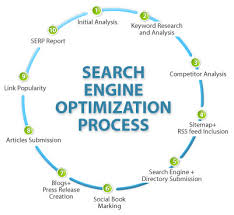The Power of SEO and Online Marketing
In today’s digital age, having a strong online presence is crucial for businesses looking to reach their target audience and drive growth. Search Engine Optimization (SEO) and online marketing play a vital role in helping businesses achieve visibility and success in the competitive online landscape.
SEO is the process of optimizing a website to improve its visibility on search engines like Google. By implementing strategic keywords, creating high-quality content, and building backlinks, businesses can increase their organic search traffic and attract more potential customers.
Online marketing encompasses various strategies such as social media marketing, email marketing, pay-per-click advertising, and content marketing. These channels allow businesses to connect with their audience, build brand awareness, and drive conversions.
By combining SEO with online marketing efforts, businesses can create a powerful digital marketing strategy that enhances their online visibility and drives traffic to their website. This integrated approach helps businesses stand out from competitors and reach a wider audience.
Furthermore, SEO and online marketing provide valuable data insights that help businesses understand their target audience better. By analyzing metrics such as website traffic, click-through rates, and conversion rates, businesses can refine their strategies for optimal results.
Overall, investing in SEO and online marketing is essential for businesses looking to thrive in the digital world. By leveraging these powerful tools effectively, businesses can increase brand awareness, drive traffic to their website, and ultimately boost sales and revenue.
Top 7 Frequently Asked Questions About SEO and Online Marketing
- What is SEO and why is it important for online marketing?
- How does keyword research impact SEO strategies?
- What are the key components of a successful SEO campaign?
- How can businesses improve their search engine rankings through SEO?
- What are the benefits of incorporating social media marketing into an online marketing strategy?
- How does content quality affect SEO performance?
- What tools and analytics can businesses use to measure the success of their online marketing efforts?
What is SEO and why is it important for online marketing?
Search Engine Optimization (SEO) is a strategic process aimed at improving a website’s visibility on search engine results pages. It involves optimizing various aspects of a website, such as content, keywords, and backlinks, to rank higher in organic search results. SEO is crucial for online marketing because it helps businesses attract more organic traffic, increase brand visibility, and reach their target audience effectively. By implementing effective SEO strategies, businesses can enhance their online presence, drive more qualified leads to their website, and ultimately boost conversions and revenue. In essence, SEO is the cornerstone of successful online marketing efforts as it allows businesses to stand out in the competitive digital landscape and connect with potential customers searching for their products or services.
How does keyword research impact SEO strategies?
Keyword research plays a crucial role in shaping SEO strategies by helping businesses identify the terms and phrases their target audience is searching for online. By conducting thorough keyword research, businesses can uncover high-value keywords that have the potential to drive organic traffic to their website. Integrating these strategic keywords into website content, meta tags, and other elements helps improve visibility on search engine results pages. Furthermore, understanding user search intent through keyword research allows businesses to create relevant and valuable content that resonates with their audience, ultimately enhancing the effectiveness of their SEO efforts.
What are the key components of a successful SEO campaign?
When it comes to a successful SEO campaign, several key components play a crucial role in driving results. First and foremost, keyword research is essential to identify relevant search terms that align with the business’s goals and target audience. On-page optimization, including creating high-quality content, optimizing meta tags, and improving website structure, helps search engines understand the website’s relevance. Off-page optimization through link building and establishing authority from reputable sources boosts the website’s credibility. Regular monitoring and analysis of performance metrics allow for adjustments and continuous improvement in the SEO strategy. By integrating these key components effectively, businesses can enhance their online visibility, attract organic traffic, and achieve sustainable success in their SEO campaigns.
How can businesses improve their search engine rankings through SEO?
Businesses can improve their search engine rankings through SEO by implementing a comprehensive strategy that focuses on key elements such as keyword research, on-page optimization, quality content creation, and building high-quality backlinks. By conducting thorough keyword research to identify relevant and high-traffic keywords, businesses can optimize their website content to align with search intent and attract organic traffic. On-page optimization involves optimizing meta tags, headings, and URL structures to make the website more search engine-friendly. Creating high-quality, relevant content that provides value to users not only boosts search engine rankings but also enhances user engagement. Building authoritative backlinks from reputable websites helps establish credibility and signals to search engines that the website is a trusted source of information. By consistently implementing these SEO best practices, businesses can enhance their search engine rankings and increase visibility in search results.
What are the benefits of incorporating social media marketing into an online marketing strategy?
Incorporating social media marketing into an online marketing strategy offers a multitude of benefits for businesses. Social media platforms provide a powerful avenue to engage with a target audience, build brand awareness, and drive website traffic. By leveraging the vast reach and targeting capabilities of social media channels, businesses can connect with potential customers in a more personalized way, fostering relationships and loyalty. Additionally, social media marketing allows for real-time interaction, feedback, and insights that can inform and enhance overall marketing strategies. Ultimately, integrating social media into an online marketing strategy can lead to increased visibility, brand authority, customer engagement, and ultimately drive conversions and sales.
How does content quality affect SEO performance?
The quality of content plays a significant role in SEO performance as search engines prioritize valuable, relevant, and engaging content. High-quality content not only attracts more organic traffic but also encourages user engagement and increases the likelihood of backlinks from reputable websites. Search engines reward websites that provide informative and well-crafted content by ranking them higher in search results. Therefore, maintaining a focus on producing top-notch content that meets the needs of users is essential for improving SEO performance and establishing authority in the digital landscape.
What tools and analytics can businesses use to measure the success of their online marketing efforts?
Businesses can utilize a variety of tools and analytics to measure the success of their online marketing efforts. Popular tools like Google Analytics provide valuable insights into website traffic, user behavior, and conversion rates. Additionally, platforms such as SEMrush and Moz offer comprehensive SEO analytics to track keyword rankings, backlinks, and competitor analysis. Email marketing tools like Mailchimp or Constant Contact provide metrics on open rates, click-through rates, and subscriber engagement. Social media platforms also offer built-in analytics to monitor engagement, reach, and audience demographics. By leveraging these tools and analytics effectively, businesses can gain a deeper understanding of their online marketing performance and make data-driven decisions to optimize their strategies for success.




